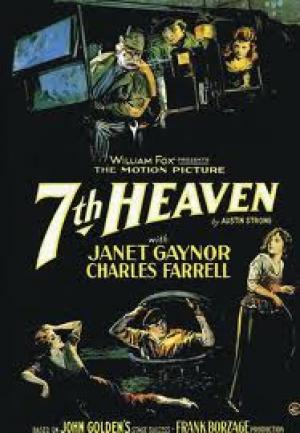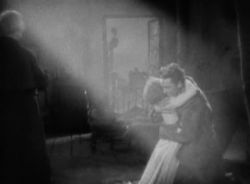Silent Heaven
By Robert Regan
There are films in every great director’s life that mark, or perhaps create, major career-changing moments. For Frank Borzage, there was Land o’ Lizards in 1916, his first feature after seventeen 2 and 3 reelers; four years later, there was Humoresque, a critical success, a box-office record breaker, and a prize winner. In 1927, 7th Heaven surpassed the achievements of the latter film and, furthermore, represented the first full flowering of his artistic sensibility. Though this was present in many of his earlier films (indeed, it is there in his first film in 1915, The Pitch o’ Chance), this is the first Borzage masterpiece, by which all his later work would be measured.
There are also films for which a director has the right material that brings out his best, and for which all of his collaborators, the writers, cinematographer, designers, and cast are all perfectly chosen and perform at their best; in short, films in which everything works! 7th Heaven is a prime example of these. William Fox paid a small fortune for the screen rights to the long-running Broadway play by the now forgotten Austin Strong, a great-nephew of Robert Louis Stevenson. The original star was Helen Menken, soon to become Humphrey Bogart’s first wife. As one can see from the more faithful adaptation in 1937 by Henry King with James Stewart and Simone Simon, Strong’s work is marked by sentimentality rather than sentiment and religiosity rather than spirituality.
Early in the film’s pre-production, direction was assigned to Emmett J. Flynn who had recently had some success with East Lynne, another popular stage play that had already been filmed at least eleven times, but studio boss Winfield Sheehan, leery of Flynn’s alcoholism, fired him and wisely offered the job to Borzage. The original screenwriter was Frances Marion, but she dropped out for reasons that are not clear, shortly after the new director took over. Benjamin Glazer, an Irish playwright who had just adapted Flesh and the Devil at MGM, was hired and received sole credit for the script, as well as an Academy Award. Other Oscars, as they were not yet called that first year, were awarded to Borzage for Best Director and Janet Gaynor for Best Actress. Glazer and Borzage later worked together on A Farewell to Arms, creating the director's first masterpiece of the thirties.
The cinematographer was to be Ernest Palmer who shot 165 movies between 1918 and 1960, including Street Angel and The River as well as three earlier pictures for Borzage, 4 Devils and City Girl for Murnau, and Rouben Mamoulian’s Blood and Sand which won him the 1941 Oscar for Color Cinematography. The art director was Harry Oliver who designed all of Borzage’s films through Lilliom in 1930, as well as City Girl. The studio, planning to go all out on this production, wanted to shoot on location in Paris, but after a scouting trip to the City of Lights that he enjoyed immensely, the director decided that he and Oliver would create their own Paris on Fox's enormous back lot.
Among the women who tested for Diane, 7th Heaven‘s lead, were Mary Pickford, Bessie Love, Dolores Costello, Blanche Sweet, Joan Crawford, and Helen Menken. Both William Fox and Winfield Sheehan favored Madge Bellamy, but Borzage was inflexible on the matter and had enough clout at the studio to resist pressure from management. He had spent an hour on the set of Victor Schertzinger’s The Return of Peter Grimm observing five foot tall Janet Gaynor. Departing without a word, he went directly to Sheehan and told him that she was Diane; there was no need for a test. Although she had been in a couple dozen uncredited bits and a handful of featured roles, including John Ford’s The Shamrock Handicap and Blue Eagle, Gaynor, at twenty, was still essentially an unknown in the business and to fans. The studio had earmarked Chico, the male lead, for John Gilbert whom they had wanted to lure back to Fox from MGM, but this did not work out. Besides, as is certainly clear in retrospect, the director was set upon unknowns for both leads. His first choice was one Bernard Nedell whom he had seen play the part on stage in Albany. There is no information available as to why Borzage was in Albany, but the story is that Nedell did not want to work in Hollywood. This is questionable, as he had already made a few films and would appear in character and bit parts in about fifty more, including Strange Cargo with Borzage in 1940. Joel McCrea was tested. and George O’Brien was considered, but then assigned to Sunrise. Another story is that Charles Farrell went to Borzage’s office to intercede for his friend Richard Arlen for Chico. A few minutes with the 6’ 2" actor was enough for Borzage. and Farrell was hired on the spot. The twenty-one year old had been playing bit parts since 1923 and had just played his first lead in James Cruze’s Old Ironsides but, like Gaynor, was still relatively unknown. The two would subsequently appear together in twelve more pictures.
Production was delayed, as Murnau was using virtually the entire lot, as well as Gaynor, for Sunrise. At Fox that year, what Murnau wanted, Murnau got. A lot of mileage was gotten from his huge expensive city set; it was redressed for 7th Heaven and Ford’s Four Sons, among other fortunate productions. Incidentally, Borzage hating war as he did, the battle scenes here were shot by fellow Fox employee John Ford.
Kent Jones wrote in 1997 in The Sanctum Sanctorum of Love, a brilliant and pioneering essay on Borzage, “Seventh Heaven represents the most dramatic instance in Borzage’s work of the collapse of time outside of the space created by love. Within Chico’s apartment 'near the stars,' time is elongated and becalmed, allowing for the smallest reverberation in Diane’s heart to register as her joyful certainty and the space around her unite. Outside, the war and life in the factory are quickly summarized, perfunctory activities in broad, indifferent spaces." Yes, the focus here is on the intimacy of Chico and Diane and their private place at the top of the stairs, introduced by a staggeringly beautiful vertical pan up to the seventh floor, but this is placed in the context of a city, a neighborhood, and a dozen friends and neighbors. Borzage's lovers never existed in a vacuum; they would struggle against the Depression, War, and the Rise of Nazism. Although Borzage made many exceptional films before this, it was here, in the midst of a troubled marriage, that he created an ideal couple in a less than ideal world around them
It should be noted here that, while Frank Borzage exacted exceptional restraint from his leading players, even at the moments of the most intense emotion, he sometimes let his character actors run a bit wild. Among the large cast of 7th Heaven are former director Emile Chautard, valued mentor of Josef Von Sternberg, and future director David Butler, a competent craftsman who directed some of the most popular films with Shirley Temple, Bob Hope, and Doris Day.






